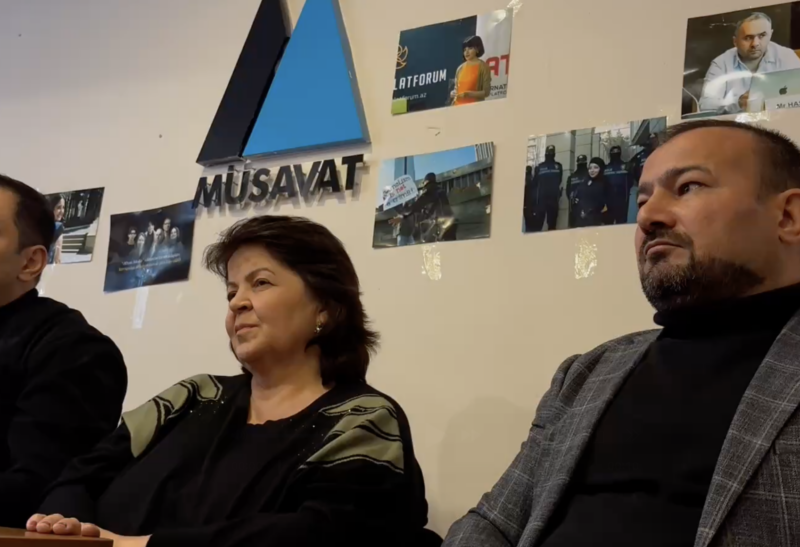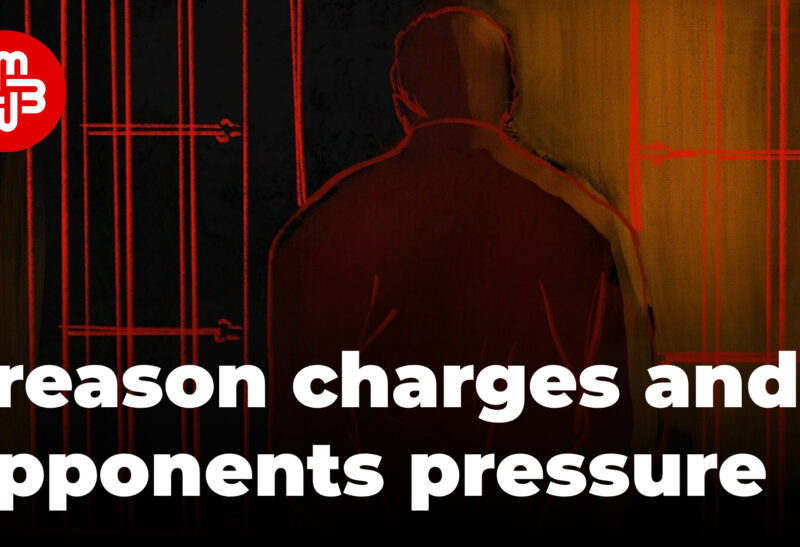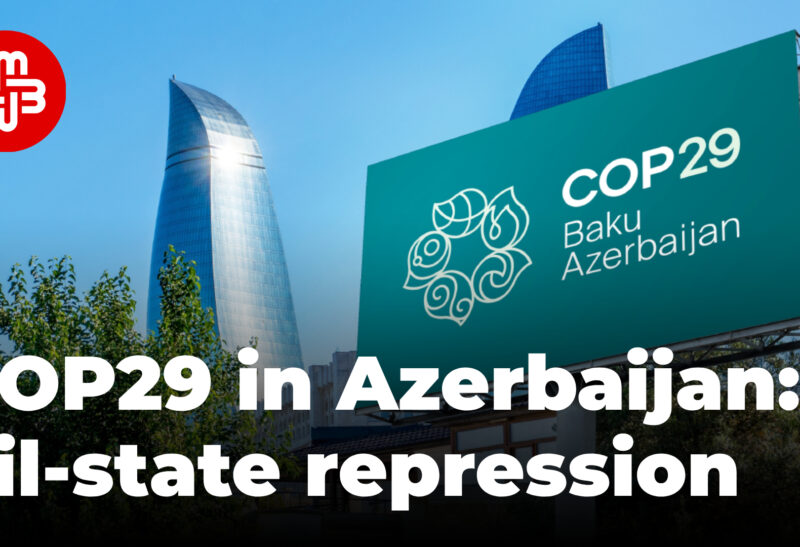The Azerbaijani journalist was abducted in Tbilisi in 2017, arrested in Baku, and exiled to Berlin immediately after being released from the courtroom
Azerbaijani journalist Afgan Mukhtarli was released on 17 March. In Azerbaijan, he is known for his investigative reporting on corruption at the top levels of the government. The story of the release of the journalist from prison generated as much public reaction and was as full of surprises as his arrest.
Mukhtarli went missing in Tbilisi on 29 May 2017. He settled down in Georgia's capital city in 2015 together with his wife Leyla Mustafayeva, also a journalist, and their little daughter in a bid to save himself from the Azerbaijani government. The next day it became known that Mukhtarli was in Baku and charged with illegally crossing the border, smuggling and offering resistance to police. The journalist said back then that he was abducted in the center of Tbilisi by several men, who tied him, beat him and pushed him into a car after putting a sack on his head. The journalist's close ones blamed it on the Azerbaijani and Georgian special services.
Giorgi Mgebrishvili, the then interior minister of Georgia, said they knew nothing about exactly how the journalist crossed the border. He said 343 witnesses were questioned, including 61 border guards in the Lagodekhi section of the Georgian-Azerbaijani border, and that dozens of video recordings filmed in the streets of Tbilisi were examined, and all phone calls of the Azerbaijani journalist were checked. However, they never managed to find anything suspicious, related to violence against Mukhtarli or his
abduction
.
Shortly before being arrested, Mukhtarli said that he was chased but the Georgian government did not react. He said that since the beginning of 2017 Georgia had tried to drive out Azerbaijani political activists, journalists and human rights who had relocated to Georgia.
The Georgian government denied involvement in Mukhtarli's abduction and denied cooperating with the Azerbaijani special services. However, the chiefs of Georgia's counterintelligence and border service were dismissed from their posts after the incident.
In Azerbaijan, Mukhtarli was sentenced to six years in prison.
International human rights organizations declared the journalist a prisoner of conscience. In June 2018, the European Parliament passed a resolution on "The case of Afgan Mukhtarli and situation of media in Azerbaijan" that called on Baku to release the journalist and on Tbilisi to investigate his alleged abduction. The journalist, however, spent almost four years behind bars.
The public did not learn about the journalist's release from prison until after he boarded a plane bound for Berlin. Mukhtarli's wife and little daughter live in Berlin now. They left Georgia after Mukhtarli was arrested. Back then, Leyla Mustafayeva renounced Georgian citizenship, which former Georgian Interior Minister Giorgi Mgebrishvili had offered her after her husband's abduction, and chose to
settle
down in Berlin.

In an interview with Meydan TV in Berlin after his release, Afgan Mukhtarli told us about reasons for his arrest, details of his abduction, and about why the Azerbaijani government decided to hastily send him to Berlin without letting him see his friends and close ones in Azerbaijan.
"While in Azerbaijan, I wrote about corruption on part of the ruling family and in different ministries, and embezzlement in the Armed Forces. In Georgia, I worked as a journalist, an investigative journalist, writing about how the Azerbaijani government invests in Georgia money that it steals from the Azerbaijani people. Those articles seriously worried both Azerbaijan and Georgia.
"Days before I was abducted, I gave an interview to Voice of America radio. I told them every single detail of how I would be handed over to the Azerbaijani government. I simply did not expect that it would be done in such a coarse manner. I thought it would be done on the basis of a court ruling. They, however, apparently decided that Georgia's judiciary was not completely under the government's control yet. It showed on the example of Dashgin Agalarli (an Azerbaijani emigre). Because Georgian courts found accusations levelled by the Azerbaijani government against Dashgin Agalarli to be absurd and granted him political asylum in Georgia. Apparently, taking that into account, the government handed me over to Azerbaijan using that illegal method. It also involved a bribe offered by Azerbaijan. Georgia was given a large bribe. When meeting with me, several senior officials in Azerbaijan told me that Georgia had received a bribe to the tune of more than 3 million USD. It was allegedly done by the former leadership of the National Security Ministry. However, in any case, it was the work of the Azerbaijani state. These kinds of decisions are made by Ilham Aliyev himself, not by a minister.
"It was an incorrect decision to abduct me, it was not even to the benefit of the government. They also put the Georgian government into jeopardy, very serious jeopardy, both in terms of its image and in terms of financial investments. International organizations had conducted numerous events there, and that generated major revenues for the tourism sector in Georgia. However, most international organizations stopped conducting events there and chose other countries."
"How were you treated in prison? Did you suffer any physical or mental abuse?"
"No, no, what was physical torture? From 29 May to 30 May, I was manacled. That is, after being abducted in Tbilisi and up until arriving at the Border Troops investigations department – for more than 24 hours – I had my hands manacled. I travelled from Tbilisi to Baku manacled and I spent the night manacled. That was physical torture. But I was not beaten or insulted or subjected to mental abuse.
"Media and also your friends and close ones reported that you went on a hunger strike. Why did you do it?"
"After meeting with me, my defense lawyer, Nemat Karimli, was assaulted by a deputy chief of the correctional facility, Emin Eminaliyev. They hit him and took documents away from him and gave those documents back to him after making copies of them. I was told so by prisoners who witnessed the incident. That is, I learnt about it not from Nemat Karimli, but from prisoners. I went on a hunger strike in protest against the incident. I did not eat for four days. I could not hunger strike for more than four days because I have diabetes and you cannot hunger strike for more than four days if you have diabetes. That's how long I was able to do it. It's not even that I was starving or feeling dizzy. I lost vision. I took freight that I would go blind and for this reason I ended the hunger strike."
"It was reported several times starting from last fall that they wanted to release you. Were those reports true?"
"Talk about it started when I obtained a new foreign passport while in prison. Then, representatives of the Azerbaijani government started visiting me. They said they wanted to release me. Also then, MPs from the Council of Europe, two MPs, met with me. Those visits continued until December. The Azerbaijani government was set to release me. Several court hearings were held. But they did not release me. And the last time I wrote an appeal, just a couple of sentences, asking to have my measure of restraint changed. And as I wrote that appeal, I thought that the same scenario as in December would repeat – that they would propose during a court hearing that the consideration of the case be rescheduled. I thought so. And, to be honest, I did not expect to be released, because I was told for six months that they would release me this time round, and they held hearings. But they did not release me. And this time round, I did not tell anyone… I did not tell even my friends in prison about it. I did not think it would happen. But suddenly they released me."

"Did it happen in one day?"
"I had written the appeal about a week earlier. But the court hearing and my release took a couple of hours. That is, the Azerbaijani government can do anything in a matter of minutes if it wants to."
"Tell us details of your release. How come you were flown to Germany after you were released? Who flew you there?"
"I was not released. The type of my penalty changed. That is, my arrest was replaced with exile. My foot never stepped on Azerbaijani soil. I got in a car at the correctional facility and got out of the car at the airport. They immediately put me on a plane.
"When they talked to me about my release, I said I wanted to stay in Azerbaijan at least for a while in order to see my mother, visit the village, and see my relatives. The person who talked to me said he was not authorized to discuss it with me and that he would inform authorized persons about the matter and that I would see [my family] if they gave me permission to do so. I do not know who those authorized persons were, but they did not give me permission."
"The news of your release came as a surprise for many people. Many did not learn about it until after you boarded the plane. Why do you think the government made a secret out of it?"
"The government did not want people to gather outside the correctional facility. It was afraid that many people might gather at the airport. They thought that if it happened, I might refuse to fly to Germany and would stay in Azerbaijan. They tried to handle the matter without creating needless problems for themselves. For this reason, they did not let that information spread. And even at the correctional facility a very limited number of people knew about it: the chief and a deputy chief.
"I am very curious as to what caused those fears. I am really curious. I did not meet anyone in prison. I could not meet with friends, I could not talk to them. Other political prisoners did not have that kind of a problem. Apparently… they [authorities] are very afraid."
"What plans do you have following your release?"
"Several of my investigations were left incomplete after my arrest. They continue to be important at present as well, and I will finish those investigations in a short while, after having a rest following my imprisonment that lasted three years."
/With the support of the Russian Language News Exchange



